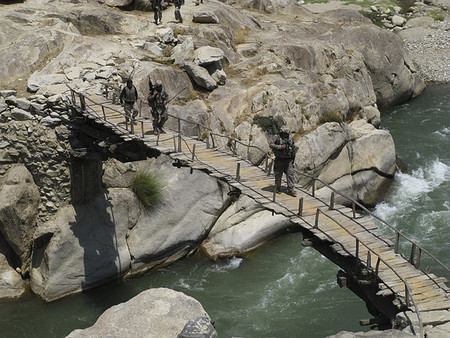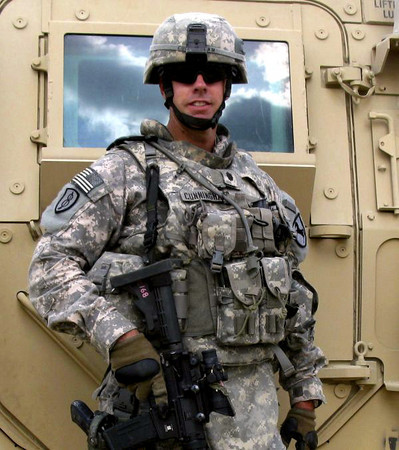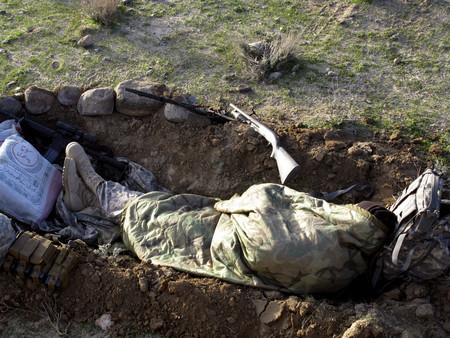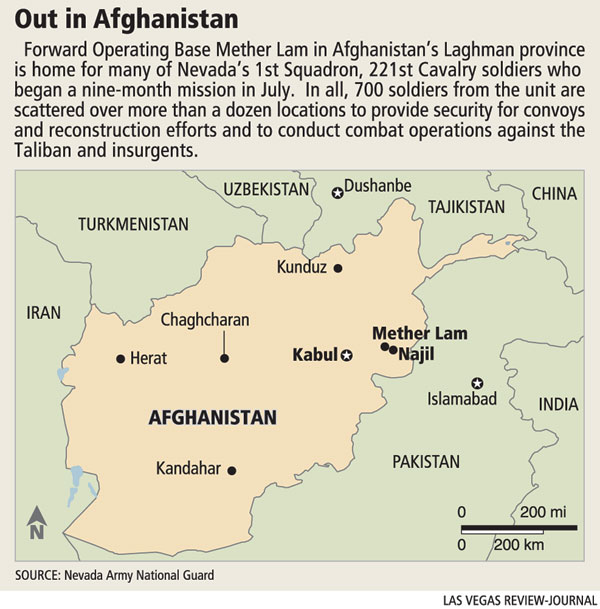Leader of Nevada military unit describes soldiers’ lives in Afghanistan




Editor’s note: In a collection of essays by Lt. Col. Scott Cunningham, we’ll follow him and the 700 soldiers he commands in the 1st Squadron, 221st Cavalry as they experience the largest overseas deployment of Nevada National Guard troops. The unit departed Las Vegas on April 18 and trained at Camp Atterbury, Ind. They were flown to Afghanistan at the end of June to conduct combat operations with NATO forces as part of Operation Enduring Freedom. Duty permitting, Cunningham will periodically report his impressions from the embattled country.
JULY 29
Laghman province, Afghanistan — The sun rises early in Afghanistan. By 5 a.m. it’s daytime. The heat soon follows and by the time the Wildhorse Squadron troopers of Nevada’s 1st Squadron, 221st Cavalry are moving to get breakfast, the temperature is approaching 100 degrees.
This is a typical day in a country 7,300 miles and 11 time zones away from our homes in Nevada.
The squadron’s first day in country began with us putting on our combat gear at the air base in Manas, Kyrgyzstan, and making the three-hour flight to Afghanistan.
We landed at the old Soviet air base at Bagram, now occupied, modernized, and expanded by the U.S. military. It’s the central hub of all U.S. operations in Afghanistan, and the typical point of entry or departure for soldiers coming and going. From Bagram, soldiers move to smaller modes of transportation (ground convoy, small plane, or helicopter) to get to their final destinations.
Upon exiting the aircraft, we are confronted by the sights, sounds, and smells of Afghanistan.
Like Nevada, Afghanistan is high desert. The only difference is that everything here is bigger and more grandiose. It’s Nevada on steroids. The mountains range from 6,000 to 14,000 feet, and many are snow-capped. It’s a beautiful, rugged landscape.
The sounds range from the roar of jets and helicopter engines winding up to the loudspeaker system known as the "Big Voice." The Big Voice alerts the vast base of incoming artillery, threats, or if U.S. aircraft are dropping bombs nearby.
The smells are the most memorable. There’s the unmistakable Third World smell of farm animals, hot desert dust, and burning trash. It’s not altogether unpleasant, but it is strong and inescapable.
Following our short stay in Bagram, we rapidly shuttled via helicopter to our operational sectors. The 11 platoons (42 troopers each) deployed into each of the provinces where they will be operating. The rest of the squadron (250 Cavalry troopers) flew into Mether Lam, located centrally in Laghman province.
Living conditions are sparse but tolerable. The structures range from tents to hardened concrete structures to "B Huts," which are prefabricated, plywood shelters akin to Quonset huts used in World War II.
All soldiers have a bed with a mattress to sleep on. There is food of varied quality, but always sufficient quantity, and all the bottled water, Gatorade, and shelf stable milk that you care to drink. This is life "inside the wire," or within the secure perimeter that’s the little slice of America we have established as our base of operations.
Afghanistan itself can best be described as a biblical-era civilization with cell phones. People live either in tents (used by the nomadic Kuchi tribes), stone-walled windowless buildings, or mud-brick compounds resembling medieval fortresses. There are numerous brick-and-mortar buildings as well as steel-concrete structures — usually no more than two- or three-stories tall — in the larger towns and cities.
The Afghans are Central Asians. It’s a tribal society based on various related, but distinguishable ethnic groups. The languages are typically Dari (a Persian-based tongue), or Pashtun, but other dialects are also common.
The women remain mostly indoors, although in the bazaars it is common to see them in burqas doing daily errands. Going through smaller villages, you might catch a glimpse of a veiled woman peering from a window or door, but never up close.
Almost all human interaction is with the men or the children. The only females you will see are girls up to about age 12, who up to that age lead lives similar to those of young boys. Children are everywhere, and it seems school hours are short and truancy is rampant.
Transportation is a challenge. The roads are poor but improving. Some asphalt roads are being constructed courtesy of U.S. development teams, but most are still dirt trails. Some routes are so poor that vehicles larger than a cart cannot hope to pass. With sheer cliffs on one side, and hundred-foot drops into chasms on the other, only the smallest of vehicles can hope to pass safely.
Automobiles are rare. Motorcycles, donkey carts, and small motorcycle-based taxis are the norm. Monstrous Soviet era trucks — known as "Jingle-trucks" for their colorful paint schemes and chain mounted decorations — are the exception. They haul anything of bulk, and their ability to navigate roads and passages that would have intimidated Marco Polo make them a transportation wonder.
Poverty is immediately evident. Most people have only one or two sets of clothing, and seeing naked children (up to 3 years old) playing by the sides of roads and trails is commonplace.
But trash is almost nonexistent. The Afghans reuse anything of value, and little goes to waste. Similarly, graffiti, which is so common in the poorer areas of most societies, is almost absent in Afghanistan. Most children are working by their early teens, and as spray paint costs money, there is little time, tolerance, or opportunity for juvenile delinquency.
The squadron has completed its relief of the outgoing infantry battalion and is fully engaged it its wartime role. The cavalry troopers have rapidly assumed the missions and daily rhythm: mounted and dismounted patrols, base defense, meetings and reconnaissance.
It’s all part of what will be going on for the next nine months throughout Afghanistan, as we try and take this nation that has suffered 30 years of warfare, insurrection and instability, and help turn it into a peaceful country with prospects for real economic, social, and governmental reform.
It’s a long road, but as the Chinese say, "Even a journey of a thousand miles begins with a single step."
Slideshow












